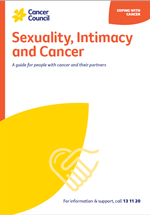- Home
- About Cancer
- Managing side effects
- Sexuality, intimacy and cancer
- Overcoming specific challenges
- Erection problems
Erection problems
There are several options for trying to improve the quality of your erections, regardless of the type of cancer treatment you have had. Ask your treatment team for more details about these methods and other things you can do to get erections firm enough for penetration.
 | TabletsThere are medicines used to increase blood flow to the penis. These only help if the nerves controlling erections are working. These tablets should not be taken with some blood pressure medicines. Check with your doctor if these could be suitable for you.Your doctor may recommend using the tablets before and soon after surgery, as the increased blood flow can help preserve penis health until the nerves recover. Tablets are also an option after radiation therapy and ADT. |
 | Vacuum erection device (VED)A VED or “penis pump” uses suction to make blood flow into the penis. This device can also help to strengthen or maintain a natural erection. You place a clear, rigid tube over the penis. A battery-operated or manual pump then creates a vacuum that causes blood to flow into the penis so it gets hard. You place a rubber ring at the base of the penis to keep the erection firm for intercourse after the pump is removed. The ring can be worn comfortably for 30 minutes.Talk to your doctor about suitable devices for you and where to buy them. |
 | Penile injection therapy (PIT)PIT involves injecting the penis with medicine that makes blood vessels in the penis expand and fill with blood, creating an erection. This usually occurs within 15 minutes and lasts for 30–60 minutes.The medicine has to be prescribed by a doctor. It often comes in pre-loaded syringes, which are single use. You can also buy it in vials from a compounding pharmacy and measure it out into a syringe yourself. You will be taught how to inject the penis. Injecting your penis may sound unpleasant, but many people say it causes only a moment of discomfort. PIT works well for many people, but a few may have pain and scarring. A rare side effect is a prolonged and painful erection (known as priapism). This needs emergency medical attention. |
 | ImplantsA penile prosthesis is a permanent implant that allows you to create an erection. Flexible rods or thin, inflatable cylinders are placed in the penis during surgery and connected to a pump in the scrotum. You turn on or squeeze the pump when you want an erection.It is usually recommended to wait at least a year after most cancer treatments before having an implant. Non-surgical options such as oral medicines or injections will usually be tried first. Occasionally, penile implants need to be removed. If this happens, you wi l no longer be able to have an erection. |
You may see or hear ads for ways to treat erection problems. These ads may be for herbal preparations, natural therapies, nasal sprays and lozenges. If you are thinking about using these products, talk to your doctor first, as there could be risks without any benefits. Products that contain testosterone or act like testosterone in the body may encourage some cancers to grow.
→ READ MORE: Changes in ejaculation
Podcast: Sex and Cancer
Listen to more of our podcast for people affected by cancer
More resources
Dr Margaret McGrath, Head of Discipline: Occupational Therapy, Sydney School of Health Sciences, The University of Sydney, NSW; Yvette Adams, Consumer; Dr Kimberley Allison, Out with Cancer study, Western Sydney University, NSW; Andreea Ardeleanu, Mental Health Accredited Social Worker, Cancer Counselling Service, Canberra Health Service, ACT; Kate Barber, 13 11 20 Consultant, Cancer Council Victoria; Dr Kerrie Clover, Senior Clinical Psychologist, Psycho-Oncology Service, Calvary Mater Newcastle, NSW; Maree Grier, Senior Clinical Psychologist, Royal Brisbane and Women’s Hospital, QLD; Mark Jenkin, Consumer; Bronwyn Jennings, Gynaecology Oncology Clinical Nurse Consultant, Mater Health, QLD; Dr Rosalie Power, Out with Cancer study, Western Sydney University, NSW; Dr Margaret Redelman OAM, Medical Practitioner and Clinical Psychosexual Therapist, Sydney, NSW; Kerry Santoro, Prostate Cancer Specialist Nurse Consultant, Southern Adelaide Local Health Network, SA; Simone Sheridan, Sexual Health Nurse Consultant, Sexual Health Services – Austin Health, Royal Talbot Rehabilitation Centre, VIC; Prof Jane Ussher, Chair, Women’s Heath Psychology and Chief Investigator, Out with Cancer study, Western Sydney University, NSW; Paula Watt, Clinical Psychologist, WOMEN Centre, WA.
View the Cancer Council NSW editorial policy.
View all publications or call 13 11 20 for free printed copies.
Need to talk?
Support services
Coping with cancer?
Speak to a health professional or to someone who has been there, or find a support group or forum
Life after cancer treatment
Webinars, exercise and nutrition, sexuality programs, and back-to-work support
Cancer information
Your coping toolbox
Strategies for managing difficult situations during and after cancer treatment
View our publications
Guides and fact sheets for people with cancer, their families and friends

